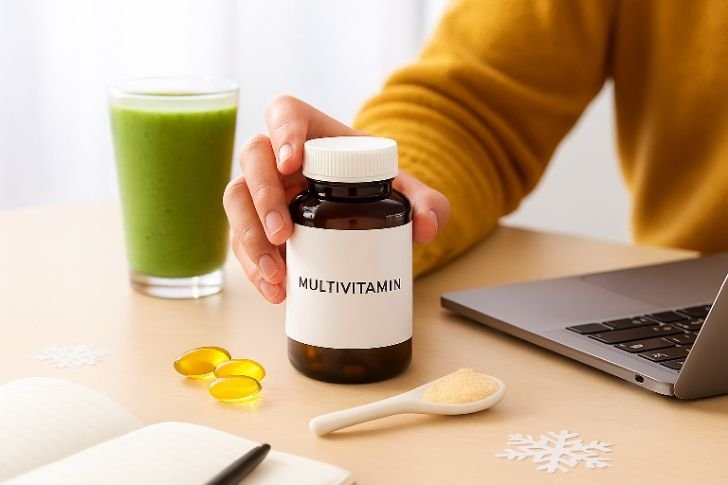Introduction: Do You Need Multivitamins in Modern Life?
People often asking again and again: do you need multivitamins? The truth about multivitamins is not simple, it is layered, confusing, and sometimes even contradictory. Walk into any pharmacy or grocery store, and you see shelves exploding with colorful bottles labeled “Vitamins and Supplements.” Shiny promises like “boost energy,” “support immunity,” “help hair growth” make it sounds like multivitamins are the magic bullet for all health problems. But are multivitamins necessary for everybody, or only for some groups?

In fact, many individuals swallow daily multivitamins without knowing if they actually needs them. Others feel guilty for skipping their one-a-day pill, like they are betraying their body. But research show something more complex: sometimes you may benefit, sometimes it’s waste of money, and sometimes it even harmful if overdosed.
This article will go deep into the truth about multivitamins. We will explore what they are, when multivitamins should be taken, when do I take multivitamins, and also: should I take multivitamins when sick? You will discover the role of Vitamin D, prenatal vitamins, liposomal vitamin C, best multivitamin for women, best multivitamin for men, and even trendy products like Hiya vitamins.
• Many lifestyle factors influence whether your body actually benefits from supplements. Stress, pollution, lack of sunlight, poor sleep, and processed foods all contribute to nutrient deficiencies. That’s why a simple diet might not always be enough. Many people keep asking the same question over and over again: do you need multivitamins if you already eat clean foods? The answer depends on your unique circumstances, not just on your menu.
So let us ask again: do you need multivitamins? Let’s find out.
What Exactly Are Multivitamins?
Multivitamins are supplements that usually contain combination of vitamins and minerals, sometimes also herbs, enzymes, and other compounds. They designed to fill nutritional gaps in diet. For example, if you are not eating enough fruits, vegetables, whole grains, or protein sources, a multivitamin may help cover missing nutrients.
But here is the thing: vitamins and supplements cannot fully replace healthy diet. A pill is not a plate of broccoli. Multivitamins are intended as insurance, not as main source of nutrition. Still, millions people taking them daily believing it is must-have.
• Another key distinction people overlook is the difference between multivitamins and single supplements. For example, someone might take Vitamin D, fish oil, or magnesium individually, thinking it covers their needs. But a multivitamin offers a broader safety net of nutrients. The confusion arises here: do you need multivitamins if you are already taking single vitamins separately? The truth is, sometimes you do, especially if your single supplements don’t cover the full nutritional spectrum.
The History and Marketing Behind Multivitamins
The first commercial multivitamins appeared in the early 20th century, when scientists just started to isolate vitamins like Vitamin C and Vitamin D. By the 1940s, multivitamins were marketed heavily as the symbol of modern science meeting health.
Fast forward today: the vitamins and supplements industry worth billions. Companies use emotional marketing: parents giving kids Hiya vitamins to “grow strong,” adults swallowing gummies to “avoid colds,” athletes choosing liposomal vitamin C for faster recovery.
But marketing doesn’t always reflect truth about multivitamins. Many claims are exaggerated, some are true, and some are not tested enough.
• Back in the early 1900s, people relied almost entirely on whole foods, fresh produce, and sunlight to maintain health. But with the industrial revolution and modern diets, deficiencies became more common, and supplements started filling the gap. Today, fortified foods like cereals and juices complicate the picture. Many consumers are left wondering: do you need multivitamins in a world already full of fortified products? Marketing often pushes us to buy, but the real answer should come from individual health needs.
Do You Really Need Multivitamins?
The central question: are multivitamins necessary? The answer depends.
If your diet is balanced and full of diverse whole foods, you may not need them at all.
If you have restricted diet (vegan, vegetarian, or food allergies), you might benefit.
If you are older adult, absorption of vitamins may decrease, making supplements more useful.
If you are pregnant, prenatal vitamins are essential, not optional.
But taking random multivitamins without guidance can be like throwing darts in the dark. Sometimes you get benefit, sometimes nothing, sometimes negative effect.
• Different groups have different needs. Students under stress, athletes pushing their bodies, seniors with weaker absorption, and pregnant women with higher nutrient demands may all benefit from multivitamins. On the other hand, certain groups such as those with kidney or liver disease might need to avoid them unless prescribed. So, the debate continues: do you need multivitamins if you are healthy, or only if you are sick? This is not a one-size-fits-all answer.
Key Nutrients to Pay Attention To
Vitamin D: The Sunshine Vitamin
Vitamin D deficiency is very common, especially in winter months when sunlight exposure is low. Unlike other vitamins, it is hard to get enough Vitamin D from food alone. That is why many doctors recommend supplementing Vitamin D or choosing multivitamins containing it.
👉 You can explore Vitamin D supplements on Amazon here: Check Vitamin D options on Amazon
Vitamin C and Liposomal Vitamin C
Vitamin C is classic immune booster. Regular Vitamin C supplements are common, but liposomal vitamin C is marketed as more bioavailable, meaning better absorbed. Evidence is still developing, but many people prefer it for immunity.
👉 Try popular Liposomal Vitamin C: See product on Amazon
Prenatal Vitamins
For pregnant women, prenatal vitamins are not optional. They supply folic acid, iron, calcium, and other nutrients critical for baby’s growth. Without them, risks of neural tube defects or anemia increase.
👉 Discover Best Prenatal Vitamins: Shop Prenatal Vitamins on Amazon
Hair Growth and Beauty Supplements
“Vitamins for hair growth” and “hair vitamins” are booming category. Biotin, Vitamin E, Zinc are often included. While some people notice improvements, results vary.
👉 See trending Hair Vitamins: View Hair Vitamins on Amazon
• Besides the popular ones like Vitamin D and calcium, other nutrients such as magnesium, zinc, and the B-complex play a huge role in energy production, focus, and immunity. When people feel tired, they immediately think of coffee, but the real issue may be hidden nutrient gaps. This leads to the question: do you need multivitamins for energy, or is your fatigue simply the result of stress and lack of sleep? For many, it’s a mix of both, and that’s where a multivitamin can offer balance.
Best Multivitamin for Women vs Best Multivitamin for Men
Not all bodies have same requirements. Women often need more iron due to menstruation, and prenatal vitamins if planning pregnancy. Men usually need more zinc, selenium, and sometimes higher doses of Vitamin D.
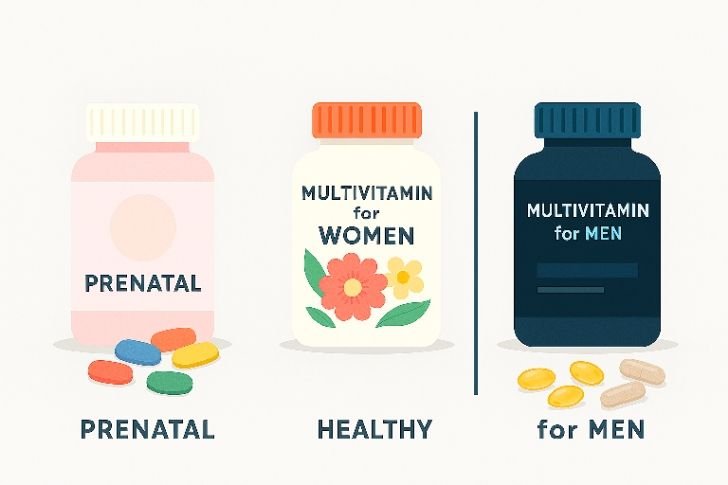
👉 For Women: Best Multivitamins for Women on Amazon
👉 For Men: Best Multivitamins for Men on Amazon
By choosing gender-specific formulas, you avoid imbalances like excess iron for men or too little folate for women.
When Is the Best Time to Take Multivitamins?
This question appears everywhere: when do I take multivitamins? The truth: timing matters, but not as much as consistency.
Multivitamins with fat-soluble vitamins (A, D, E, K) should be taken with meals containing healthy fat.
Morning is often better because some vitamins provide energy.
Avoid taking right before bed, because Vitamin B may disturb sleep.
So when is the best time to take a multivitamin? Usually breakfast or lunch works best.
Some ask: when multivitamins should be taken if I’m sick? In sickness, your body demand for nutrients may rise, but it’s not cure for illness. So should I take multivitamins when sick? Yes, but they are not medicine, just support.
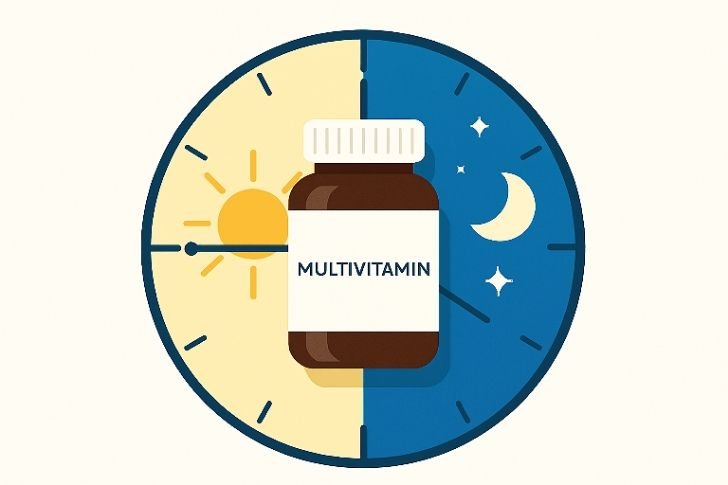
• Timing matters, but so does your lifestyle. High caffeine intake can block the absorption of certain nutrients, while smoking and alcohol deplete vitamins faster. Prescription medications may also interfere. So, do you need multivitamins if lifestyle factors are already blocking your nutrient absorption? In this case, the right supplement taken consistently can help you maintain a healthy balance.
Common Myths About Multivitamins
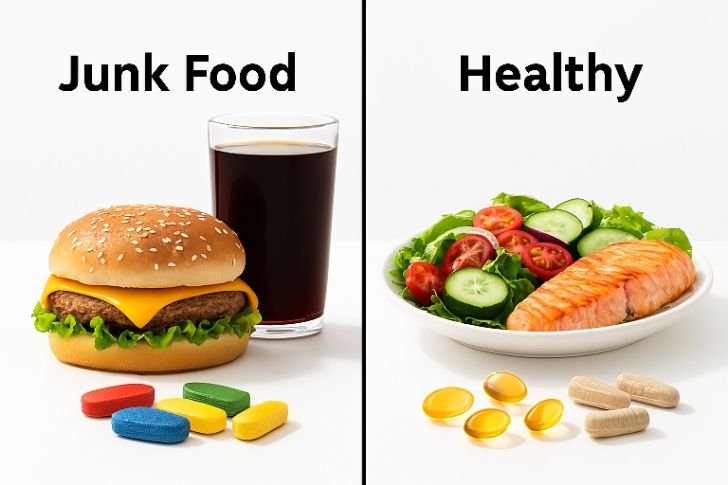
1. Myth: Multivitamins prevent all diseases.
Truth: They may reduce deficiency risk but cannot replace healthy diet.
2. Myth: Everyone must take them.
Truth: Many people don’t need them if diet is strong.
3. Myth: More is always better.
Truth: Overdosing vitamins can cause toxicity (Vitamin A, Iron, etc).
4. Myth: Children always need Hiya vitamins or gummies.
Truth: If kids eat balanced meals, supplements may not be necessary.
• Here are some frequently asked questions people have about multivitamins:
Should I take multivitamins when I’m sick? → They might support recovery but should not replace medical care.
Do you need multivitamins after age 40? → Yes, since nutrient absorption declines with age.
Do you need multivitamins if you eat superfoods every day? → Not always, but even superfood diets can have gaps.
Are multivitamins necessary for athletes? → Extra activity burns more nutrients, so sometimes yes.
Do you need multivitamins when following a vegan diet? → Absolutely, since B12 and iron are often low.
These questions show how widespread the confusion is around supplementation.
Risks of Overusing Multivitamins
Too much is dangerous. For example:
Excess Vitamin A → liver toxicity.
High Iron → constipation, stomach upset, organ damage.
Over-supplementation of Vitamin D → kidney issues.
So, are multivitamins necessary for healthy adults? Not always. They should be targeted, not random.
•Another overlooked issue is drug interaction. Blood thinners, thyroid medications, and certain antibiotics can all be affected by vitamins and minerals. That’s why doctors and pharmacists frequently hear the question: do you need multivitamins if you’re already on prescription medications? The answer is complicated and always depends on dosage, timing, and the type of drug you’re taking.
Choosing the Right Multivitamin
When you buy multivitamins, look for:
Reputable brands with 3rd-party testing.
Avoid fillers, artificial colors, harmful additives.
Choose formulas tailored to your age, gender, and lifestyle.
Read labels carefully: Cluster 14 article explains this in detail (coming soon).
• Reading the label is a crucial step. Some products have 20+ ingredients with amounts too small to make a difference, while others have high-quality, bioavailable forms of nutrients. The consumer is left confused: do you need multivitamins with long ingredient lists, or is a simple, focused formula enough? Simplicity often works better than overwhelming blends.
👉 See trusted Multivitamins on Amazon: Buy Now on Amazon
Practical Scenarios
Busy professional: skipping meals, might benefit from basic multivitamin.
Pregnant woman: needs prenatal vitamins daily, non-negotiable.
Athlete: may require extra Vitamin D, magnesium, or Vitamin C.
Older adult: may absorb less B12, Vitamin D → supplementation recommended.
How Multivitamins Fit Into Seasonal Immunity Strategies
In our Cluster 11 article on seasonal immune boosters, we discussed how natural remedies like elderberry, sea moss, and olive leaf support immunity during colder months.
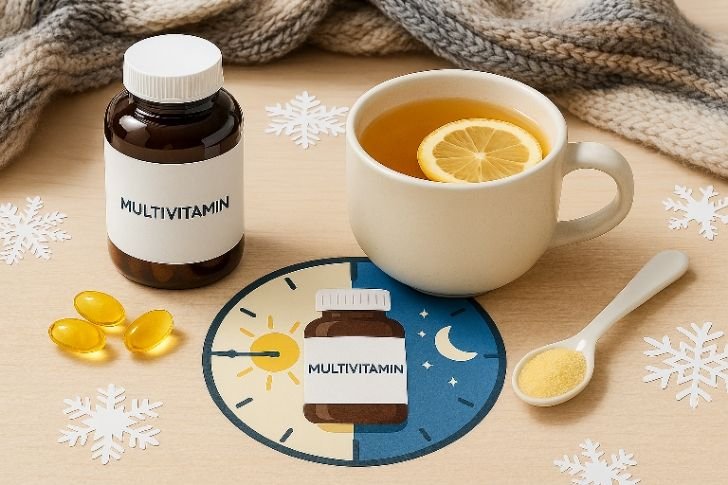
But when it comes to long-term health, vitamins and supplements—especially Vitamin D and Vitamin C—play an equally important role. Still, they work best when combined with a balanced lifestyle rather than being relied on as a quick fix.
👉 Dive deeper into seasonal strategies in our guide: Best Seasonal Immune Boosters: What Works in Fall vs. Winter
• It’s also worth comparing multivitamins to functional foods. Many cereals are fortified with iron, orange juice is enriched with calcium, and snack bars often contain added B vitamins. This leads to another common dilemma: do you need multivitamins if you already eat fortified cereals and juices? In some cases, fortified foods provide enough, but not always consistently.
Final Thoughts: Do You Need Multivitamins?
So, after all the science, myths, and marketing—do you need multivitamins? The answer is personal. For some, yes absolutely. For others, maybe not.
The truth about multivitamins is that they are not miracle pills, but they can be supportive tools when used wisely. Ask yourself: is your diet lacking? Do you have special conditions (pregnancy, old age, restricted eating)? If yes, multivitamins may be valuable. If no, maybe save your money and focus on fresh foods.
Always remember: supplements are just that—supplementary. They add to, not replace, the foundation of nutrition.
At the end of the day, the question remains central: do you need multivitamins or not? The answer depends on your age, lifestyle, and diet. While they can be powerful allies, they should never replace mindful eating, stress management, and healthy daily habits.
Quick Affiliate Recommendations
Best Multivitamin for Women – Shop on Amazon
Best Multivitamin for Men – Shop on Amazon
Liposomal Vitamin C – See on Amazon
Hair Vitamins – Shop here
Prenatal Vitamins – Buy now
